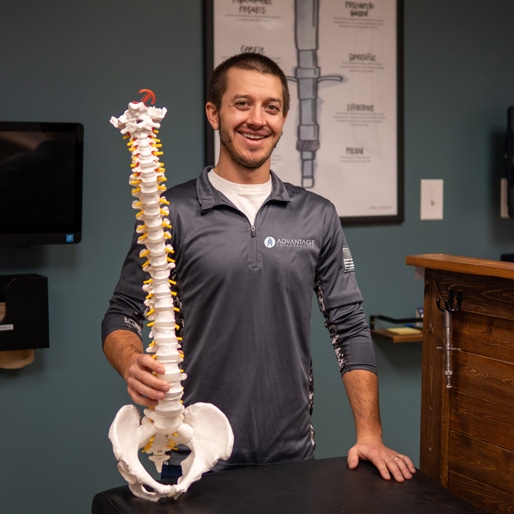
Chiropractic Treatment for Neuropathy
Millions of people experience neuropathy pain, yet many are unaware that chiropractic care can provide relief. Advantage Health Center in Eau Claire, WI, offers a unique approach to managing this painful condition. Dr. Zach Bruley, board-certified in treating neuropathy, is specially trained in the highly effective Torque Release Technique.
The most effective treatment varies depending on the underlying cause of the nerve damage. The encouraging news is that patients can take steps to manage nerve pain and related symptoms.
Opting for chiropractic care for neuropathy is one of the most effective ways to alleviate pain and enhance your quality of life.
Our Neuropathy Chiropractors in Eau Claire , WI

Dr. Zach Bruley
BOARD CERTIFIED IN NEUROPATHY
Trustindex verifies that the original source of the review is Google. Enjoy the encouragement both verbal and written by Dr ZachTrustindex verifies that the original source of the review is Google. Great place to get the help you needTrustindex verifies that the original source of the review is Google. Dr. Zach Bruley knows what he is doing. He cares about his patients and listens. The adjustments are gentle and happen little at a time. He has you do stretches and I am so happy to do them. Also water has more important become part of my life now thanks for him. I came to him because of migraines and hes been helping me. Ive come with other problems and even in extreme pain. Hes helped me a whole bunch and highly recommend him.Trustindex verifies that the original source of the review is Google. Friendly and knowledgeable. Treatments help body function and feel betterTrustindex verifies that the original source of the review is Google. WONDERFULL RESULTS ! treatment program has given me back my ability to function without a walker or wheelchair. Chronic Degenerative Disc Disease as well as peripheral neuropathy limited my activities of daily living. I can feel my feet and hands and mobilize my spine without debilitating pain. My balance, circulation, muscle strength, and mobility have improved. I am now gardening, driving, and attending social activities. Dr. Zack is knowledgeable, provides details of treatment process, and he as well as entire staff are congenial, helpful, and supportive. AWESOME CLINICTrustindex verifies that the original source of the review is Google. I would highly recommend going here. They are very attentive, wonderful service, and of course super friendly. They build your care plan with you and show you progress along the way!Trustindex verifies that the original source of the review is Google. The doctor and the receptionist are always very friendly and positive. They take the time to answer your questions fully and make sure you have a good understanding of what’s taking place.Trustindex verifies that the original source of the review is Google. Very satisfyingTrustindex verifies that the original source of the review is Google. Trustindex verifies that the original source of the review is Google. Hoping this is what I need
What Is Neuropathy?
Neuropathy is a condition that impacts the peripheral nervous system. In it, nerves become damaged and gradually lose their ability to transmit signals from the body to the brain. This results in pain and loss of sensation and control in the affected areas.
Neuropathy affects about 2.4% of the population. Patients often experience pain, numbness, sensations similar to electrical shocks, and muscle weakness as the condition progresses. Various factors can cause neuropathy, including diabetes, alcoholism, injuries, and certain medications.
Treatment outcomes depend primarily on the underlying cause of neuropathy. However, with the assistance of a chiropractor, it is possible to alleviate pain and other symptoms.
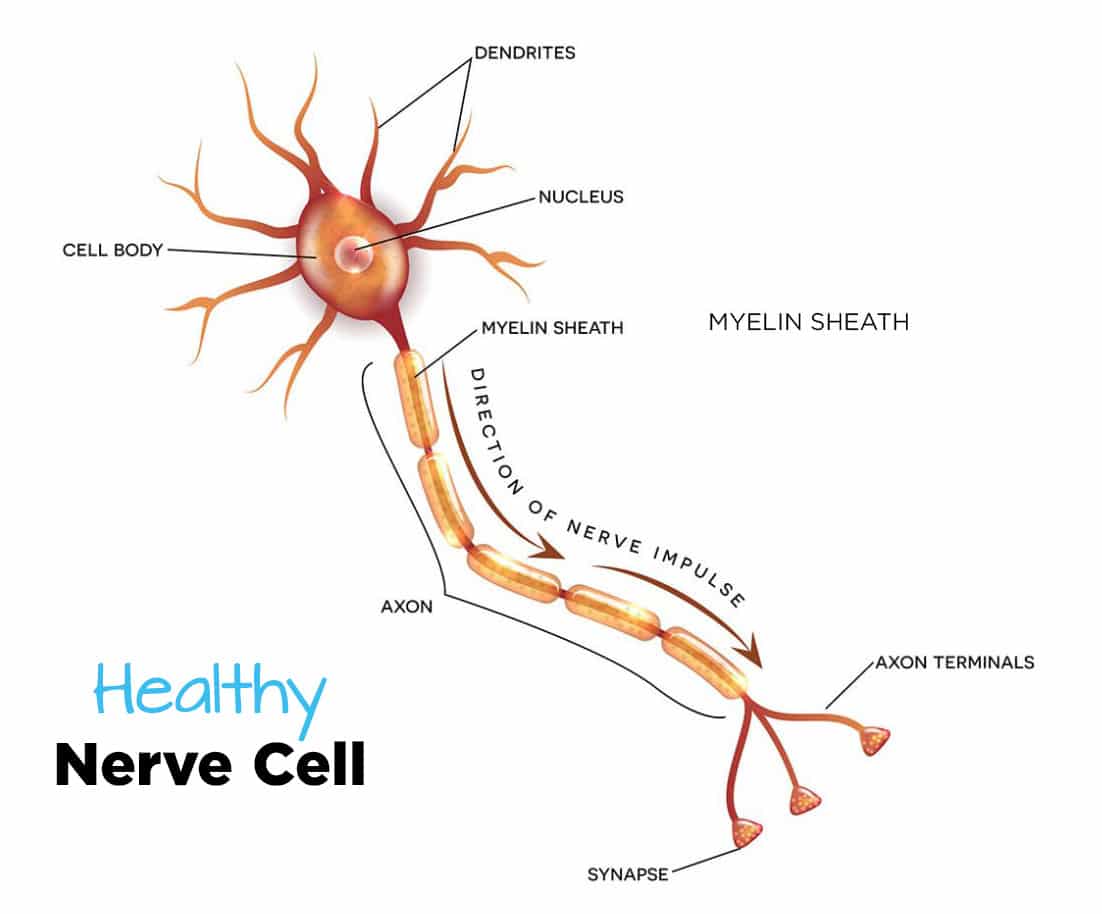
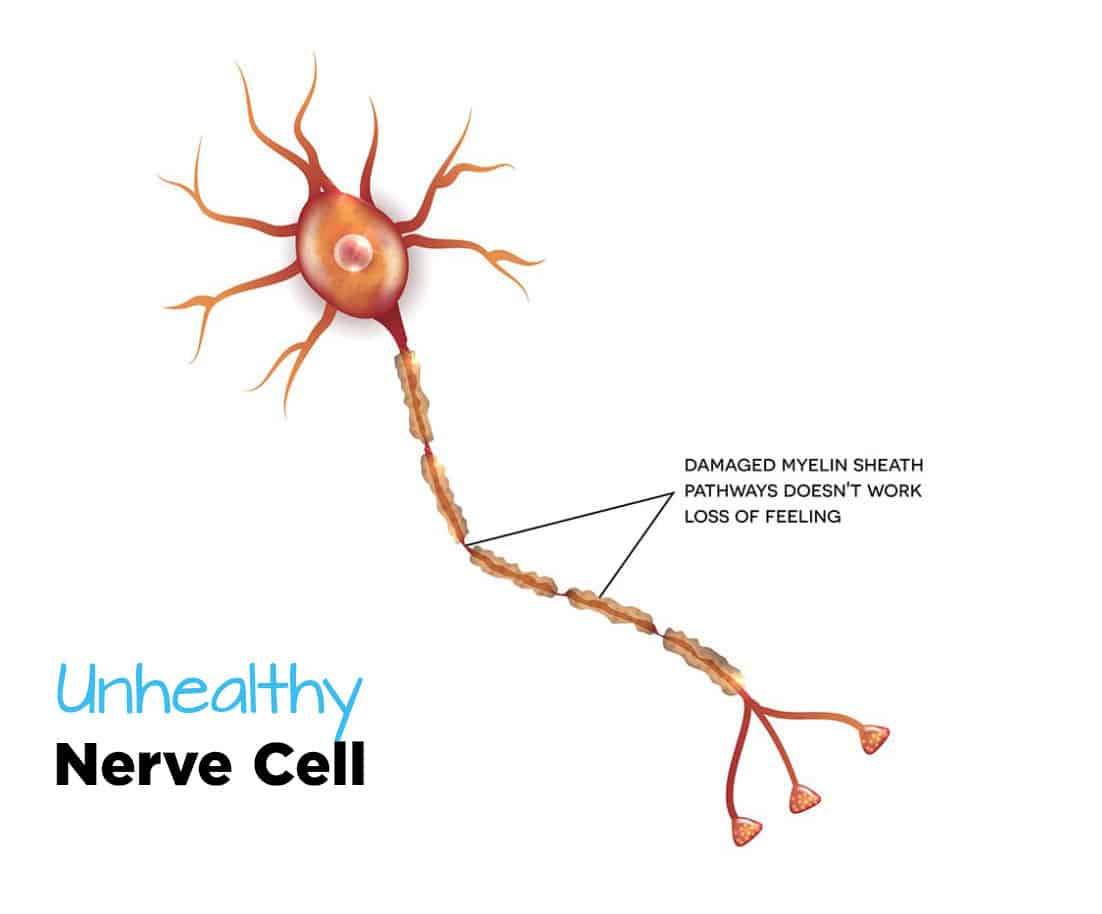
How Chiropractors Help With Neuropathy
Chiropractic care stands apart from other medical treatments by harnessing the body’s natural ability to heal. Techniques like the Torque Release Technique and other spinal adjustments help correct spinal alignment, improving blood flow to the 31 pairs of spinal nerves. This can relieve pressure on the spinal cord and enhance nerve signal transmission.
Chiropractors can also alleviate tension in tight muscles that cause nerve compression and signal blockages. By reducing pressure on the neck and shoulder muscles, chiropractic care can provide pain relief for neuropathy and support the proper function of the peripheral nervous system.
Chiropractic care is particularly effective because it offers personalized treatment plans for a wide range of conditions. If you suffer from neuropathy, your chiropractor will tailor a plan specifically designed to address both your symptoms and the underlying causes.
Benefits of a Chiropractor Neuropathy Treatment

Pain Relief
Through spinal manipulation and adjustments, chiropractors can alleviate the burning, tingling, and painful sensations associated with neuropathy.

Improved Nerve Function
Tight muscles and poor spinal alignment can disrupt nerve signals. Chiropractic care can enhance nerve function, leading to improved sensations and better motor control.

A Non-Invasive Treatment
Chiropractic care is a safe, non-invasive treatment option that can be easily scheduled around other medical procedures. Patients can enjoy the benefits without worrying about side effects.

A Holistic Approach
Chiropractors adopt a holistic approach to wellness, creating treatment plans that address a broad range of symptoms and underlying conditions.

Reducing Inflammation
Researchers suggest that inflammation is a key factor in various forms of neuropathy. Managing inflammation can help alleviate symptoms and protect nerves from further damage.

Personalized Care Plan
The role of a chiropractor is to create a personalized care plan tailored to each patient. They consider the patient’s symptoms and needs before designing a treatment plan. Chiropractors also work within the patient's budget and schedule to provide convenient care.
Read a more detailed article about the benefits of seeing a chiropractor.
What are Neuropathy Symptoms?
The most common symptom of neuropathy is pain in the affected areas, often described as stabbing or shooting. Others may experience tingling or burning sensations. Numbness and a “pins and needles” feeling are also frequent signs.
Peripheral nerve damage can increase sensitivity to touch and cold, often causing spontaneous pain. Some patients also experience muscle wasting, sexual dysfunction, and sensations of being hot or cold.
As neuropathy progresses, muscle weakness can develop, particularly in the hands and feet, leading to balance issues, falls, and coordination difficulties.
When autonomic nerves are affected, symptoms may impact organs and bodily functions. Depending on the location of the nerve damage, this can lead to a drop in blood pressure, digestive problems, or urinary system issues.
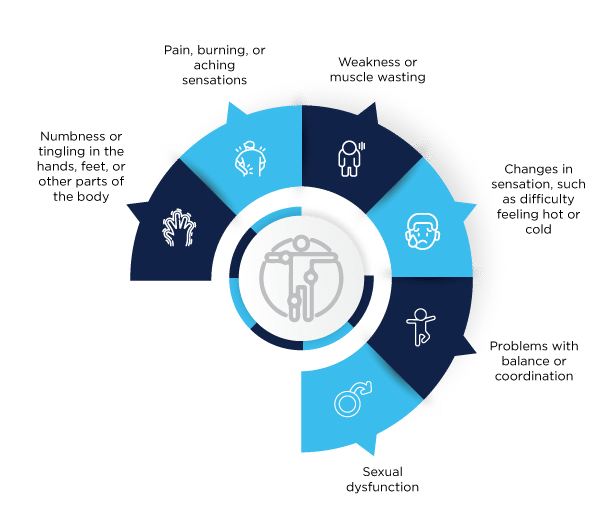
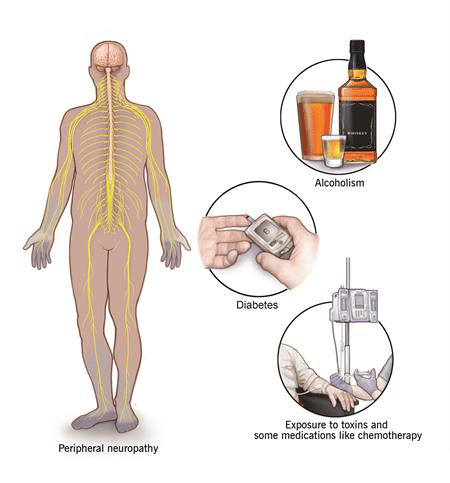
What are the causes of Neuropathy?
Here are some of the most common causes:
- Diabetes: Neuropathy affects between 6% and 51% of adults with diabetes. High blood sugar levels can damage nerves, particularly in the legs and feet.
- Alcoholism: Excessive alcohol consumption can lead to nerve damage due to its toxicity. Malnutrition resulting from heavy drinking can further damage the nervous system.
- Medications: Certain prescription drugs can cause neuropathy as a side effect. This is common with chemotherapy drugs, as well as medicines for high blood pressure, infections, seizures, HIV/AIDS, and autoimmune diseases.
- Injury or Surgery: Neuropathy can result from traumatic injuries or surgical procedures that sever or damage nerves.
- Infections: Viruses and bacteria can attack nerves when the immune system is weakened. Neuropathy is not uncommon in patients with HIV, Lyme disease, hepatitis, or shingles.
- Autoimmune Disorders: Conditions like lupus and rheumatoid arthritis can cause inflammation, which, if left uncontrolled, can lead to neuropathy.
- Genetic Disorders: Some genetic conditions, particularly those involving physical deformities that impact nerve function, can cause hereditary neuropathy.
4 Main Types of Neuropathy
Chiropractic care can help alleviate symptoms associated with these four types of neuropathy:
Peripheral Neuropathy
Peripheral neuropathy pain is the most common form, affecting an estimated 20 million people.
This type of neuropathy impacts the peripheral nervous system and typically results in symptoms affecting the hands and feet. Carpal tunnel syndrome is a typical example of this condition.
Autonomic Neuropathy
The autonomic nervous system controls various body functions, such as digestion, respiration, and heart rate.
Symptoms of autonomic neuropathy may include loss of bladder control and dizziness due to difficulty regulating blood pressure.
Focal Neuropathy
Focal neuropathy generally impacts a single nerve or a small group of nerves. Symptoms can vary from a tingling sensation to intense pain or even paralysis.
Cranial Neuropathy
Cranial nerves connect directly to the brain, playing a pivotal role in controlling facial expressions and sensory experiences.
Damage to these nerves can impact your ability to smell, hear, and taste. You may also lose sensation in your face or find it difficult to control your facial expressions.
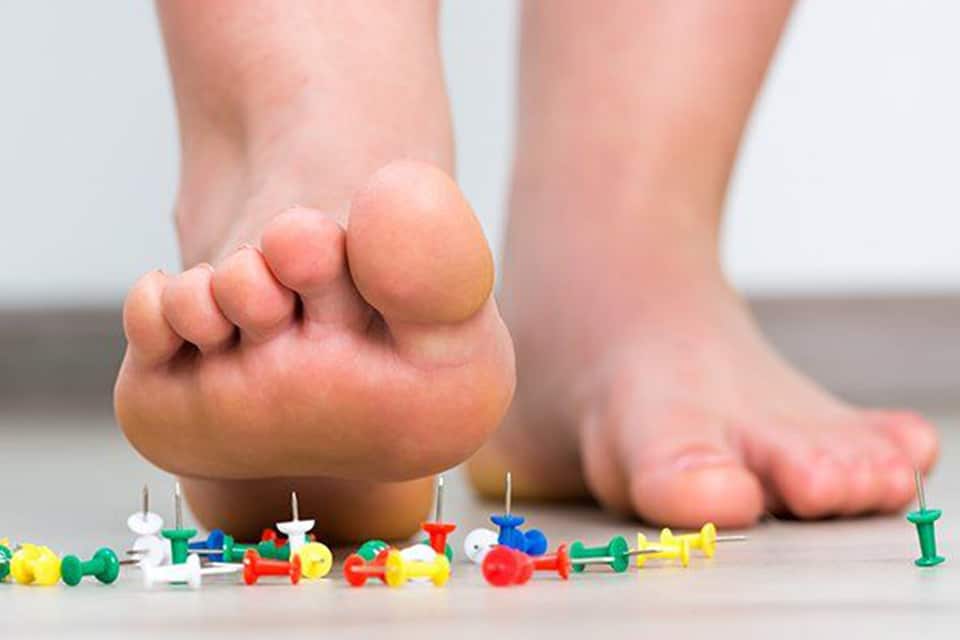
4 Stages of Neuropathy
Without controlling the underlying causes, neuropathy will continue to progress, typically advancing through four stages:
Stage 1:
Patients often notice numbness, tingling, or burning sensations in their extremities in the early stages. These sensations may come and go or occur when pressure is applied to the affected areas.
Stage 2:
As nerve damage worsens, the pain becomes constant, interfering with daily activities. Patients may also experience additional symptoms, such as difficulty with motor control.
Stage 3:
The pain intensifies, significantly affecting the patient’s quality of life. Finding relief becomes challenging, and the condition may spread to other body areas.
Stage 4:
In advanced neuropathy, there can be a complete loss of sensation in the affected regions. Patients may no longer respond to touch, painful stimuli, or temperature changes, and paralysis may occur.
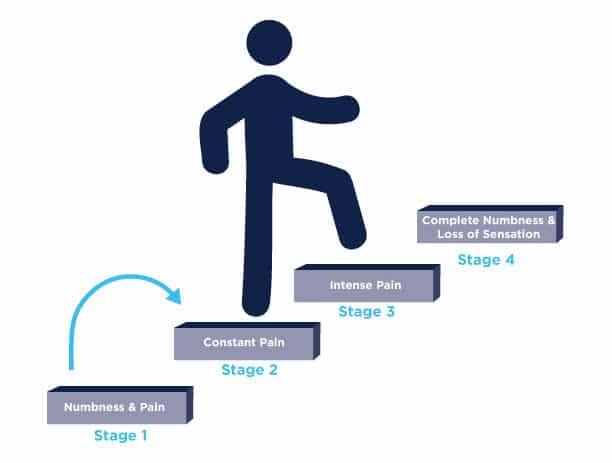

Other Treatment Options for Neuropathy
Since an underlying condition causes neuropathy, effective therapy must address the medical issue responsible for the nerve damage.
A holistic treatment plan should include strategies for managing pain and other symptoms. Relief is often achieved by focusing on the root cause of the condition.
Chiropractic care is a safe and non-invasive option for treating neuropathy. A chiropractor can easily design a treatment plan that includes adjustment sessions along with other treatment options, such as:
- Medications, including pain relievers, antidepressants, and antiseizure drugs
- Topical treatments, such as patches and creams
- TENS (Transcutaneous Electrical Nerve Stimulation) units
- Plasma exchange
- Cold laser therapy
- Acupuncture
- Surgery
- Physical therapy
- Massage therapy
- At-home pain relief techniques
- Compression socks to alleviate pain
How Can I Prevent Neuropathy?
If you’re at risk for neuropathy, there are several steps you can take to protect yourself from nerve damage:
- Diabetic Neuropathy: Managing your blood sugar levels and maintaining a healthy weight can significantly reduce peripheral nerve pain.
- Alcohol Consumption: Reducing alcohol intake or seeking addiction treatment can help prevent neuropathy caused by excessive drinking.
- Nutrition: Following a healthy, balanced diet and knowing which foods to avoid can support nerve health. Taking supplements can help protect nerves, especially if you have a vitamin deficiency.
- Protective Gear: Wearing protective equipment during risky activities can prevent traumatic injuries that may affect the nerves.
- Stress Management and Lifestyle Changes: Managing stress, eating a healthy diet, and staying active can help reduce inflammation and prevent complications. Quitting smoking should be a priority, as it can exacerbate inflammation.
- Healthy Lifestyle: Adopting a lifestyle that includes a balanced diet, regular exercise, and good sleep hygiene will support overall health.
- Regular Medical Check-Ups: Scheduling regular check-ups and blood tests with your doctor can help detect conditions early that may lead to neuropathy, allowing for prompt care and prevention.
Taking prescribed medication and adhering to other aspects of your treatment plan can help protect you from nerve damage.

Get The Care You Need in Eau Claire
While neuropathy cannot be reversed, you can manage pain and other symptoms by addressing the underlying cause. Chiropractic care for neuropathy can help alleviate pain and improve your quality of life by enhancing nerve function.
If you live in Wisconsin, consider visiting Advantage Health Center in Eau Claire for all your chronic pain needs.
Questions about Chiropractic Neuropathy
What foods should I avoid?
Living with neuropathy requires careful attention to your diet, as certain foods can worsen symptoms while others can help alleviate them. Sugary foods should be avoided because they can increase inflammation and pain.
Processed foods and simple carbohydrates can cause blood sugar spikes, which may exacerbate neuropathy symptoms. Instead, focus on consuming fresh fruits and vegetables, lean proteins, and healthy fats. These nutrient-dense foods can help keep your nerves healthy and reduce your symptoms.
Can neuropathy be corrected?
Neuropathy can be difficult to manage, but the good news is that it can be treated with chiropractic care and lifestyle changes. If you have neuropathy, consult a medical professional to learn more about your treatment options. With the right care, you can improve your symptoms and lead a full, healthy life.
Cost of Neuropathy Treatment in Eau Claire?
What is Neuropathy Treatment Cost by a Chiropractor in Eau Claire, WI?
For neuropathy treatment from a chiropractor in Eau Claire, here’s a quick breakdown of out-of-pocket costs for chiropractic care:
| Service/Treatment | Cost Range |
|---|---|
| Initial Consultation | $60 – $200 |
| Customized Treatment | $100 – $250 |
| Standard Adjustments | $50 – $75 |
| Intensive Sessions | $100 – $250 |
Costs depend on treatment complexity, so discussing options and pricing with your chiropractor is recommended.

About the Author
Dr. Zach Bruley, D.C., is the founder of Advantage Health Center in Eau Claire, WI, and a graduate of Northwestern Health Sciences University. Dedicated to a neurologically based approach, he holds advanced certification in the Torque Release Technique (TRT) and specializes in non-invasive protocols for Neuropathy and Spinal Decompression. Drawing on his background as a competitive athlete, Dr. Bruley established the clinic to provide precise, instrument-based care that supports the body’s natural ability to heal and perform at its peak.




